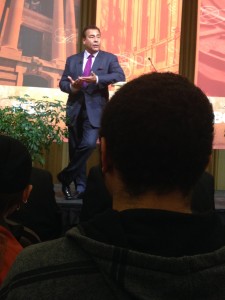Mr. Quinones delivered an exceptional message to the Bowling Green State university audience this past Thursday.
John Quinones related his speech to the works of Martin Luther King Jr, “What would you do when you are witnessing justice” said Quinones speaking to the BGSU audience. Mr. Quinones delivered the message of stepping up and doing the right thing when something is noticeably wrong and you are put into a situation in which helping could cause conflict. “Take advantage of every opportunity that you have” Quinones stated “No matter how tough things get, keep you eyes on the prize and you will get there.” Quinones motivated the group of college students in front of him by using powerful quotes like this to show them that anything is possible if you keep pushing and keep your heart set on your goals. Mr. Quinones stressed morals such as doing the right thing and the fact that you really never know who is watching. The overall message related to Martin Luther King and the ways he impacted society even when times seemed extremely tough, and almost impossible.
Mr. Quinones discussed how he grew up into poverty and kept pushing through even when his ethnicity pushed him away from his dream of being a journalist. Starting at the very bottom, he was able to overcome the racial barrier at the time and achieve his dream of being a nationally recognized journalist. Mr. Quinones preached the ideals that Mr. King would like to have heard. He stressed the fact that the ethic and racial barrier can prevent a person from trying to achieve their dreams and he explained how he was able to push through it to become such a fantastic journalist.
Overall Mr. Quinones spoke with great passion about his profession and was extremely well received by the BGSU audience. He inspired and informed his audience by telling about his own personal journey and his past life experiences. Mr. Quinones is a real life example of how hard work truly pays off and no matter how hard something is to get it is always achievable.
Following the highly anticipated speech of the legendary journalist, a question-and-answer session was held on Thursday morning Jan. 30 in Olscamp Hall to further persuade students and listeners on how to follow their dreams. During the session, Quinones hinted that there are “very few positive stories about the Latino community.” With that said, many Latinos in the audience related to this by asking questions on how to succeed underneath the negative impression that they tend to give the media.
Because of these concerns, Quinones communicated several positive messages that were aimed at giving hope not just to the Latino population, but to the entire audience in general.
One way that Quinones encouraged listeners was to have them realize that their unique talents and traits can help to make a difference, regardless of color, race, ethnicity, etc.
“Our unique backgrounds can get us to places where no one else is going,” Quinones said.
Along with embracing one’s talent, Quinones advised the audience to use the “burning in their belly” as a tool for success.
“It’s hard to motivate someone who does not believe it in his heart,” said Quinones. “What is it that will motivate you to make a difference?”
While some forms of media such as the evening news have declined because of an increase in sources, Quinones indicated that this does not mean journalism as a whole is dying. On that note, Quinones urged journalists not to feel discouraged by these economic matters in the light of their own success.
Yes, with receiving news, “we don’t have to wait until 6:30 and viewership has gone down,” as Quinones said. However, Quinones still basically stressed the fact that society needs to be informed and that “we should give viewers what they need.”
In fact, Quinones’ affiliated network, 20/20 still generates 5-7 million viewers each night!
“There will always be a need for people to tell stories,” said Quinones.
What is next for Quinones in the future? Quinones announced that 20/20 is currently filming between two and three episodes each week for a new season of What Would You Do. May 23 was mentioned for an upcoming release date of the new episodes.
Childhood
John Quinones was born into poverty in San Antonio, Texas in 1952. His mother worked cleaning houses in the suburban area of San Antonio and his father was a janitor. Neither one of his parents spoke English. Quinones’ father couldn’t read or write. He grew up at the time of the Civil Rights Movement. When he went to school, there were no classes on how to speak English. This was tough for Quinones because he only spoke Spanish. If he spoke in Spanish he would get in trouble. Even in junior high if he spoke Spanish, the coach would paddle him. In elementary the teacher his name from Juan to John because she said it sounded better.
Education
Quinones received a bachelor of arts in speech communications from St. Mary’s University, San Antonio, Texas. He received a master’s from the Columbia School of Journalism
Career
- Quinones has won seven national Emmy Awards for his “Primetime Live,” “Burning Questions” and “20/20” work
- Was awarded an Emmy for his coverage of the Congo’s virgin rainforest (also won the Ark Trust Wildlife Award)
- Received an Emmy for “Window in the Past,” a look at the Yanomamo Indians in 1990
- National Emmy Award for his work on the ABC documentary “Burning Questions—The Poisoning of America
- Honored with a World Hunger Media Award and a Citation from the Robert F. Kennedy Journalism Awards for “To Save the Children
- 1990 report on the homeless children of Bogota. Among his other prestigious awards are the First Prize in International Reporting and Robert F. Kennedy Prize for his piece on “Modern Slavery — Children Sugar Cane Cutters in the Dominican Republic.”

